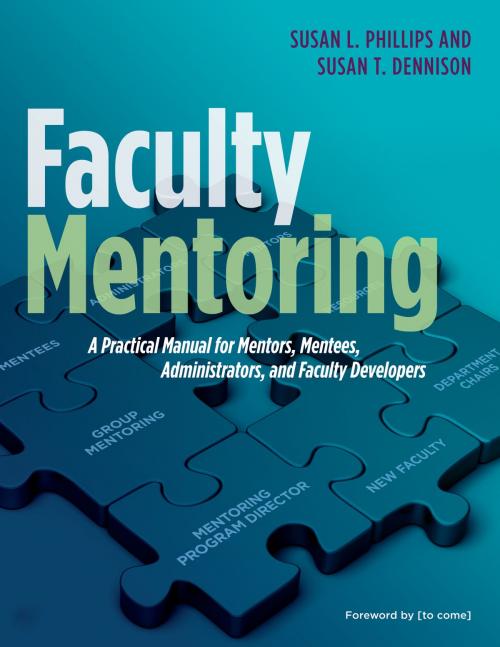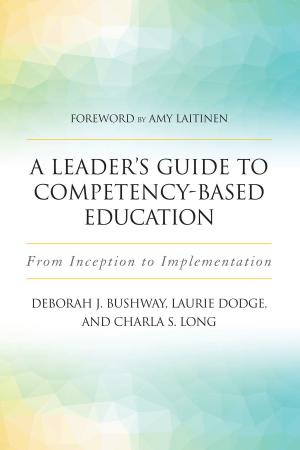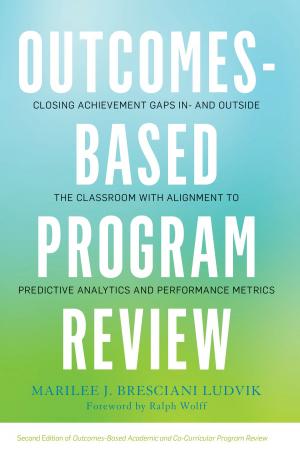Faculty Mentoring
A Practical Manual for Mentors, Mentees, Administrators, and Faculty Developers
Nonfiction, Reference & Language, Education & Teaching, Higher Education| Author: | Susan L. Phillips, Susan T. Dennison | ISBN: | 9781620361740 |
| Publisher: | Stylus Publishing | Publication: | August 13, 2015 |
| Imprint: | Stylus Publishing | Language: | English |
| Author: | Susan L. Phillips, Susan T. Dennison |
| ISBN: | 9781620361740 |
| Publisher: | Stylus Publishing |
| Publication: | August 13, 2015 |
| Imprint: | Stylus Publishing |
| Language: | English |
Faculty mentoring programs greatly benefit the institutions that have instituted them, and are effective in attracting and retaining good faculty.
Prospective faculty members commonly ask about mentoring at on-campus interviews, and indicate that it is a consideration when choosing a position. Mentoring programs also increase the retention rate of junior faculty, greatly reducing recruitment costs, and particularly help integrate women, minority and international faculty members into the institution, while providing all new hires with an orientation to the culture, mission and identity of the college or university.
The book provides step-by-step guidelines for setting up, planning, and facilitating mentoring programs for new faculty members, whether one-on-one, or using a successful group model developed and refined over twenty-five years by the authors. While it offers detailed guidance on instituting such programs at the departmental level, it also makes the case for establishing school or institutional level programs, and delineates the considerable benefits and economies of scale these can achieve.
The authors provide guidance for mentors and mentees on developing group mentoring and individual mentor / protégé relationships – the corresponding chapters being available online for separate purchase; as well as detailed outlines and advice to department chairs, administrators and facilitators on how to establish and conduct institution-wide group mentoring programs, and apply or modify the material to meet their specific needs.
One of the unique features of its development has been that much of the group model’s refinement has been based on applying it to a wide array of groups ranging from young children to the elderly. The systematic collection of qualitative data from focus groups conducted with these latter groups has informed much of the group model’s development.
The Authors
Susan Phillips developed the New Faculty Mentoring Program for The University of North Carolina at Greensboro and served as the Director for five years, and is an Associate Professor of Audiology in the Department of Communication Sciences and Disorders. She has conducted regional and national workshops on mentoring
Susan Dennison is an Associate Professor in the Department of Social Work at UNCG where she has been on faculty for 20 years. Susan’s expertise, teaching, and research have focused on group work for the past 30 years resulting in nine books along with numerous articles. She ran a national group consulting company and presented at both national and international conferences on group work.
Prospective faculty members commonly ask about mentoring at on-campus interviews, and indicate that it is a consideration when choosing a position. Mentoring programs also increase the retention rate of junior faculty, greatly reducing recruitment costs, and particularly help integrate women, minority and international faculty members into the institution, while providing all new hires with an orientation to the culture, mission and identity of the college or university.
The book provides step-by-step guidelines for setting up, planning, and facilitating mentoring programs for new faculty members, whether one-on-one, or using a successful group model developed and refined over twenty-five years by the authors. While it offers detailed guidance on instituting such programs at the departmental level, it also makes the case for establishing school or institutional level programs, and delineates the considerable benefits and economies of scale these can achieve.
The authors provide guidance for mentors and mentees on developing group mentoring and individual mentor / protégé relationships – the corresponding chapters being available online for separate purchase; as well as detailed outlines and advice to department chairs, administrators and facilitators on how to establish and conduct institution-wide group mentoring programs, and apply or modify the material to meet their specific needs.
One of the unique features of its development has been that much of the group model’s refinement has been based on applying it to a wide array of groups ranging from young children to the elderly. The systematic collection of qualitative data from focus groups conducted with these latter groups has informed much of the group model’s development.
The Authors
Susan Phillips developed the New Faculty Mentoring Program for The University of North Carolina at Greensboro and served as the Director for five years, and is an Associate Professor of Audiology in the Department of Communication Sciences and Disorders. She has conducted regional and national workshops on mentoring
Susan Dennison is an Associate Professor in the Department of Social Work at UNCG where she has been on faculty for 20 years. Susan’s expertise, teaching, and research have focused on group work for the past 30 years resulting in nine books along with numerous articles. She ran a national group consulting company and presented at both national and international conferences on group work.
Faculty mentoring programs greatly benefit the institutions that have instituted them, and are effective in attracting and retaining good faculty.
Prospective faculty members commonly ask about mentoring at on-campus interviews, and indicate that it is a consideration when choosing a position. Mentoring programs also increase the retention rate of junior faculty, greatly reducing recruitment costs, and particularly help integrate women, minority and international faculty members into the institution, while providing all new hires with an orientation to the culture, mission and identity of the college or university.
The book provides step-by-step guidelines for setting up, planning, and facilitating mentoring programs for new faculty members, whether one-on-one, or using a successful group model developed and refined over twenty-five years by the authors. While it offers detailed guidance on instituting such programs at the departmental level, it also makes the case for establishing school or institutional level programs, and delineates the considerable benefits and economies of scale these can achieve.
The authors provide guidance for mentors and mentees on developing group mentoring and individual mentor / protégé relationships – the corresponding chapters being available online for separate purchase; as well as detailed outlines and advice to department chairs, administrators and facilitators on how to establish and conduct institution-wide group mentoring programs, and apply or modify the material to meet their specific needs.
One of the unique features of its development has been that much of the group model’s refinement has been based on applying it to a wide array of groups ranging from young children to the elderly. The systematic collection of qualitative data from focus groups conducted with these latter groups has informed much of the group model’s development.
The Authors
Susan Phillips developed the New Faculty Mentoring Program for The University of North Carolina at Greensboro and served as the Director for five years, and is an Associate Professor of Audiology in the Department of Communication Sciences and Disorders. She has conducted regional and national workshops on mentoring
Susan Dennison is an Associate Professor in the Department of Social Work at UNCG where she has been on faculty for 20 years. Susan’s expertise, teaching, and research have focused on group work for the past 30 years resulting in nine books along with numerous articles. She ran a national group consulting company and presented at both national and international conferences on group work.
Prospective faculty members commonly ask about mentoring at on-campus interviews, and indicate that it is a consideration when choosing a position. Mentoring programs also increase the retention rate of junior faculty, greatly reducing recruitment costs, and particularly help integrate women, minority and international faculty members into the institution, while providing all new hires with an orientation to the culture, mission and identity of the college or university.
The book provides step-by-step guidelines for setting up, planning, and facilitating mentoring programs for new faculty members, whether one-on-one, or using a successful group model developed and refined over twenty-five years by the authors. While it offers detailed guidance on instituting such programs at the departmental level, it also makes the case for establishing school or institutional level programs, and delineates the considerable benefits and economies of scale these can achieve.
The authors provide guidance for mentors and mentees on developing group mentoring and individual mentor / protégé relationships – the corresponding chapters being available online for separate purchase; as well as detailed outlines and advice to department chairs, administrators and facilitators on how to establish and conduct institution-wide group mentoring programs, and apply or modify the material to meet their specific needs.
One of the unique features of its development has been that much of the group model’s refinement has been based on applying it to a wide array of groups ranging from young children to the elderly. The systematic collection of qualitative data from focus groups conducted with these latter groups has informed much of the group model’s development.
The Authors
Susan Phillips developed the New Faculty Mentoring Program for The University of North Carolina at Greensboro and served as the Director for five years, and is an Associate Professor of Audiology in the Department of Communication Sciences and Disorders. She has conducted regional and national workshops on mentoring
Susan Dennison is an Associate Professor in the Department of Social Work at UNCG where she has been on faculty for 20 years. Susan’s expertise, teaching, and research have focused on group work for the past 30 years resulting in nine books along with numerous articles. She ran a national group consulting company and presented at both national and international conferences on group work.















